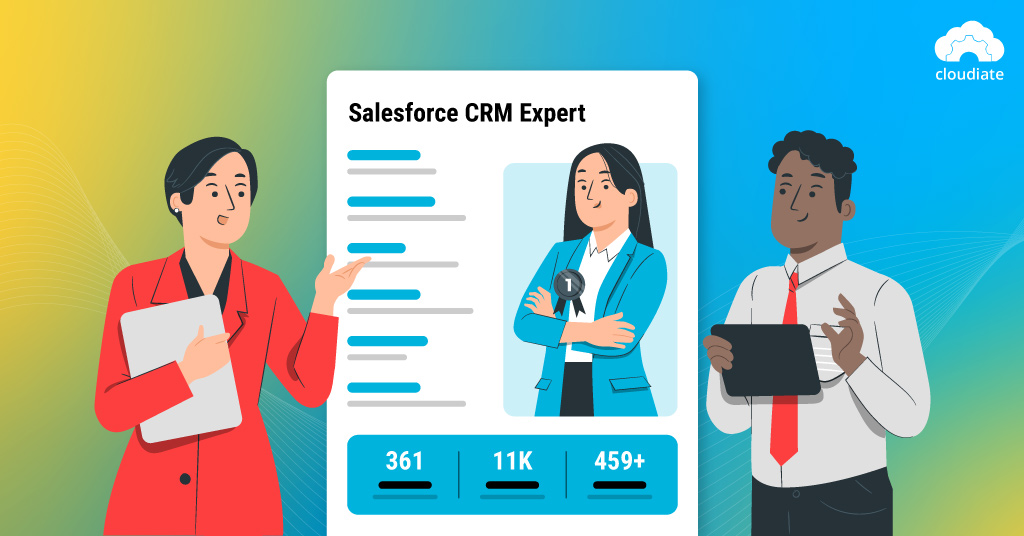In today’s fast-paced business world, navigating Salesforce CRM solutions can be a complex task, especially for businesses striving for efficiency and growth.
A FounderJar estimate reveals that 40% of companies globally are not using customer relationship management (CRM) at all, and 43% of businesses are using spreadsheets to track customer data.
This indicates a significant portion of businesses may not be leveraging advanced CRM functionalities to their fullest potential.
This guide offers a strategic approach to hiring a Salesforce CRM consultant and delves into the critical factors and practical strategies to leverage Salesforce CRM solutions for optimal business performance.
Key Considerations Before Consulting a Salesforce CRM Expert

Before engaging a Salesforce CRM consultant, businesses should carefully consider several critical factors to ensure a successful partnership:
1. Skillset Alignment
Assess the consultant’s skillset in alignment with your business challenges. Make sure that their expertise matches the specific Salesforce practicalities and industry requirements relevant to your organization’s needs.
2. Expertise and Experience
Evaluate the Salesforce CRM consultant’s knowledge and experience in Salesforce implementation and customization. A proven track record of successful projects demonstrates their ability to handle complicated issues and deliver solutions effectively.
3. Location & Cost
Consider the geographical location of the consultant and its impact on communication and collaboration. Additionally, evaluate the cost of services, ensuring it aligns with your budget while maintaining a focus on quality and expertise.
4. Continuing Management and Optimization
Make sure the consultant helps keep your Salesforce running smoothly. They should regularly check its security, manage updates, and plan for improvements in the future.
5. Credentials and Certifications
Check the consulting firm’s credentials and certifications. Confirm that they possess the necessary qualifications to meet your business demands and Salesforce requirements.
Understand Your Business Needs
While the above are key considerations to get started, before deciding to proceed with a salesforce CRM consultant, it is important to begin by understanding the business needs. This ensures that CRM efforts are directly contributing to the overarching objectives of the business. Once this understanding is in place, several benefits follow, such as:
- Maximizing ROI: A well-aligned CRM strategy helps in maximizing the return on investment by directing efforts towards goals that directly impact revenue, customer satisfaction, or market expansion.
- Efficient Resource Utilization: Aligning CRM strategies with business goals aids in the efficient use of resources such as time and money. This ensures that CRM efforts are targeted toward the areas that will yield the most significant impact on achieving business objectives.
- Improved Interdepartmental Communication: CRM strategies often involve multiple departments. Being sure of business goals enhances communication between these departments, encouraging collaboration and ensuring everyone works towards common goals.
- Centralized Data Management: CRM helps in centralizing data, making it easier to evaluate tracked information. This unified approach supports informed decision-making and ensures that data is utilized to meet specific business goals.
Get Started With a Long-Term Adoption Strategy

Implementing a durable adoption plan is essential for the long-term success of a Salesforce CRM initiative. To ensure sustained success and maximize the benefits of Salesforce, a Salesforce CRM consultant incorporates insights to create a long-term strategy.
1. Prepare for Change
Establish a mindset within the organization that embraces change. This involves creating awareness, providing adequate training, and communicating the benefits of Salesforce adoption to all stakeholders.
2. Empower Users
Enable users with the knowledge and tools they need to leverage Salesforce effectively. This includes providing ongoing training, support, and resources to empower users at all levels.
3. Drive Collaboration
Create collaboration among different departments and teams by leveraging the collaborative features of Salesforce. A well-connected organization ensures that information flows seamlessly, enhancing overall efficiency.
4. Focus on Quality Data
Emphasize the importance of maintaining clean and accurate data. A commitment to data quality ensures that the insights derived from Salesforce are reliable, leading to more informed decision-making.
5. Align with Business Objectives
Connect Salesforce strategies directly with the broader business goals. This alignment ensures that the Salesforce org is not just a tool but a strategic asset contributing to the overall success of the organization.
6. Restate and Optimize
Implement a continuous improvement cycle. Regularly assess the performance of the Salesforce org, gather feedback, and iterate the implementation to optimize its effectiveness over time.
Strategies for Leadership Support & Learning from Users
Securing leadership buy-in and learning from end-users are critical to ensure successful Salesforce adoption. Here are strategies to achieve these objectives:
Leadership Buy-In:
- Clearly Communicate Benefits: Clearly define the benefits of Salesforce adoption to leaders, emphasizing how it goes hand in hand with organizational goals and enhances productivity.
- Demonstrate ROI: Provide practical examples of how Salesforce can generate a return on investment, showcasing its impact on efficiency, customer satisfaction, and overall business success.
- Involve Leaders Early: Engage leaders in the planning phase, seeking their input and addressing concerns to create a sense of ownership.
Learning from End-Users:
- User Training Programs: Implement comprehensive training programs to empower end-users, ensuring they have the skills needed to utilize Salesforce effectively.
- Create a User Committee: Establish a user committee to encourage collaboration and gather insights from different departments, fostering a sense of inclusivity in the adoption process.
By employing these strategies, businesses can not only secure leadership support but also create an environment where end-users actively participate in and benefit from the Salesforce adoption journey.
Wrapping Up
After exploring the key facets of preparing for a Salesforce CRM consultant and navigating the adoption journey, it’s evident that businesses stand to gain substantial benefits from leveraging the expertise of Salesforce consulting firms.
Salesforce consulting services are essential because they provide expert help and tailored solutions to meet your business needs. By aligning your CRM strategies with your business goals, Salesforce becomes a valuable tool that helps your organization succeed.
By embracing the expertise of Registered Salesforce Implementation Partner Cloudiate, companies can navigate the complexities of Salesforce, drive successful adoption, and harness the full potential of this powerful CRM platform.
Contact us to know more!

